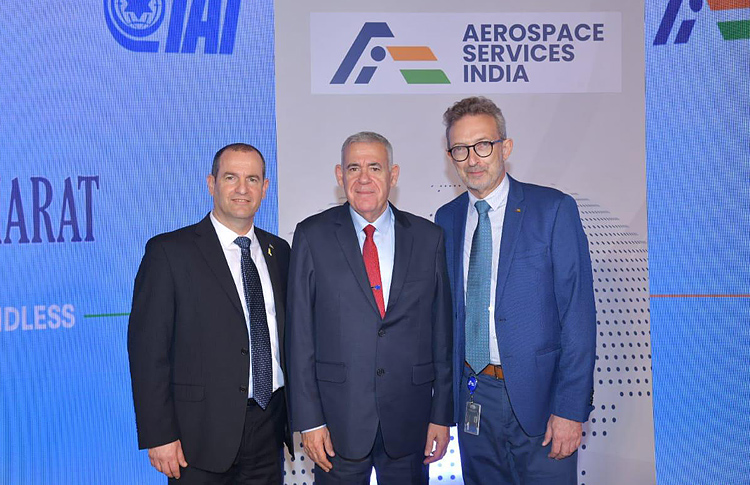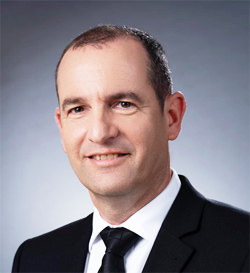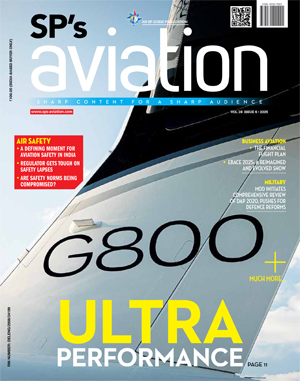INDIAN ARMED FORCES CHIEFS ON OUR RELENTLESS AND FOCUSED PUBLISHING EFFORTS

The insightful articles, inspiring narrations and analytical perspectives presented by the Editorial Team, establish an alluring connect with the reader. My compliments and best wishes to SP Guide Publications.

"Over the past 60 years, the growth of SP Guide Publications has mirrored the rising stature of Indian Navy. Its well-researched and informative magazines on Defence and Aerospace sector have served to shape an educated opinion of our military personnel, policy makers and the public alike. I wish SP's Publication team continued success, fair winds and following seas in all future endeavour!"

Since, its inception in 1964, SP Guide Publications has consistently demonstrated commitment to high-quality journalism in the aerospace and defence sectors, earning a well-deserved reputation as Asia's largest media house in this domain. I wish SP Guide Publications continued success in its pursuit of excellence.
- The layered Air Defence systems that worked superbly, the key element of Operation Sindoor
- Operation Sindoor | Day 2 DGMOs Briefing
- Operation Sindoor: Resolute yet Restrained
- India's Operation Sindoor Sends a Clear Message to Terror and the World – ‘ZERO TOLERANCE’
- Japan and India set forth a defence cooperation consultancy framework, talks on tank and jet engines
Israel Aerospace Industries (IAI) reiterates its 3-decades' long commitment with the launch of AeroSpace Services India (ASI) in New Delhi

Israel Aerospace Industries (IAI) has expanded its footprint in India with the launch of AeroSpace Services India (ASI) in New Delhi, a move that underscores its commitment to strengthening ties with the Indian defence sector. The inauguration of ASI, aligning with India's 'Atmanirbhar Bharat' initiative for self-reliance in defence manufacturing, marks a significant milestone in the partnership between IAI and India's Defence Research and Development Organisation (DRDO).
As the sole authorised OEM's Technical Representative for the Medium Range Surface-to-Air Missile (MRSAM) system, ASI operates in Indian Rupees, streamlining transactions for defence systems jointly developed by IAI and DRDO. Boaz Levy, President and CEO of IAI, expressed pride in ASI's role in advancing India's self-reliance goals, under the leadership of CEO Danny Lauber and a predominantly Indian workforce. With strategically located branches across the subcontinent, ASI aims for comprehensive service coverage and prompt customer support.
The event saw the presence of Noar Gilon, Ambassador of Israel to India, highlighting the evolution of strategic relations between the two nations, particularly in defence cooperation, facilitated by IAI's involvement. Vice Admiral B Sivakumar, the Chief Guest, envisioned efficient repair processes and emphasized the importance of product support, praising the reliability of MR-systems in challenging environments.
The occasion also witnessed the participation of senior officials from DRDO, BEL, BDL, and the industry, reflecting the collaborative efforts driving advancements in defence technology and fostering enduring partnerships between India and Israel.
During the event, Jayant Baranwal, Editor-in-Chief of SP Guide Publications, along with Neetu Dhulia, engaged in a discussion with Oded Jacobowitz, Chairman of the Board of AeroSpace Services India (ASI).
Jayant Baranwal (Jayant): As the Chairman of ASI's board, what exactly will be your role? What is the roadmap of ASI and what is the vision behind launching this Indian subsidiary from Israel?
Oded Jacobowitz (Oded): Good question! The establishment of AeroSpace Services India (ASI) marks a significant milestone in strengthening our ties with India and expanding our business operations in the region. Over the past two decades, we have collaborated closely with Indian services, particularly in the field of air defence systems. This new venture signifies a deeper commitment to conducting business directly from India, thereby fostering a stronger connection between Israel and India.
ASI represents more than just a company; it embodies a partnership between our nations. With a workforce comprising predominantly Indian professionals–technicians, engineers, and skilled personnel–ASI reflects our dedication to local talent and expertise. Currently, ASI boasts a team of approximately 50 employees, with only a handful being of Israeli origin.
Looking ahead, we envision numerous opportunities for growth, not only in providing product support within India but also in manufacturing and exporting from the region. Our collaborations extend beyond mere business transactions; we have cultivated robust relationships with both public sector undertakings such as BEL and BDL and private enterprises. Together, we have already embarked on several contractual agreements.
The systems we are involved in have been the result of collaborative efforts between esteemed organisations like DRDO, IAI, BEL, and BDL. This collective endeavour underscores the synergy and cohesion among various stakeholders, paving the way for a successful trajectory for ASI and its endeavours.
Jayant: You refer to manufacturing facility. Would it be for India and for the world, too?
Oded: Exactly! Our vision for ASI is expansive, aiming to position it alongside other Indian companies with the capability to export globally from India. However, it's essential to recognise that ASI is still in its early stages, akin to a growing child maturing into adulthood. Therefore, our approach is sequential, focusing on developing the necessary capabilities over time.
At present, we boast a robust facility capable of supporting existing contracts effectively. Looking ahead, we are keenly focused on future opportunities. For instance, as highlighted in the speech by Admiral B Sivakumar, turnaround time and service efficiency are paramount. Having a local presence in India ensures swift response times in case of failures, thereby facilitating prompt repairs.
Moreover, leveraging local resources means cost-effectiveness, as production and maintenance are carried out by skilled Indian professionals. This not only ensures competitiveness but also contributes to the local economy. In essence, our strategy revolves around gradual growth and strategic utilisation of local capabilities to achieve long-term success.
Jayant: When you say facilities, can you give us some details on these facilities and the kind of capabilities they possess, as of now in India?
Oded: Currently, we have established partnerships with Indian companies possessing the requisite capabilities, such as ADSL in Hyderabad, SASMOS, DCX, among others. Moreover, we are in the process of constructing facilities where we perceive advantages in doing so independently. However, should there be unique expertise or cutting-edge technology required, we are keen on leveraging Indian capabilities. India's infrastructure, from my experience, is exceptional, facilitating swift project execution. For instance, the recent construction of our office, which typically would take an extended duration in Israel, was completed within a few months here. This underscores India's remarkable technological and infrastructural prowess. We are optimistic about the collaborative potential between AI, ASI, and these capabilities.
Jayant: You are the MRSAM person. Through your eyes, what kind of capabilities this programme has brought to Indian armed forces? Can you elaborate a little bit for us?
Oded: I believe it has revolutionised the landscape here in India. Primarily, we are dealing with a state-of-the-art system. Globally, only a handful of companies–about five or six, to my knowledge–possess the capability to offer a comprehensive system comprising radar, command center, launchers, and missiles. At IAI, we stand out as a single entity equipped with all these capabilities. This advancement enhances the defence capabilities across the Indian armed forces–naval systems, air force, and army–significantly bolstering defence infrastructure for various sites and operational requirements. Recently, there was a noteworthy trial conducted a couple of months ago involving the naval forces. During this trial, our MRSAM system successfully intercepted a supersonic target aimed at a naval vessel, showcasing the effectiveness and reliability of our technology.
Neetu Dhulia: You mentioned about the MRO facility in Gurgaon, is the facility being established solely for the maintenance of MRSAM systems within India, or are you open to servicing similar systems from neighboring countries as well?
Oded: Excellent question! In my vision, we aim to serve not only India but also extend our services globally. As I mentioned, our focus will be on MRSAM, with plans to expand our offerings comprehensively. The first step will be to build it strongly. Our philosophy revolves around building a strong foundation before branching out. So as much as strong the company will be, then we can expand, that is in our vision. Therefore, our vision encompasses not only exporting products but also the services worldwide. As our company grows stronger, we envision expanding beyond India to fulfill our global ambitions. That was a good question!
Profile: Oded Jacobowitz, Chairman of the Board, Aerospace Services India (ASI)

Board, Aerospace Services India (ASI)
Oded Jacobowitz has been at the forefront of ASI's leadership as the Chairman of the Board of Directors since the company's inception. With a career spanning over three decades, Jacobowitz has been a pivotal figure in the Israeli aerospace industry since 2018. He initially served as the Director of Land-Based Air & Missile Defence Systems at the Defence Factory, later transitioning to the role of Deputy General Manager of Air & Missile Defence Systems in 2022.
His expertise and leadership have been instrumental in spearheading the establishment of maintenance support systems in India, a key initiative undertaken by ASI. Prior to his tenure in the aerospace industry, Jacobowitz enjoyed a distinguished 30-year career in the Israeli Defense Forces (IDF), where he held various positions in the technological array on land, retiring with the rank of Brigadier General.
Oded Jacobowitz's academic background includes a Bachelor's degree in Physics from the Technion and a Master's degree in Business Administration from Bar Ilan University.





